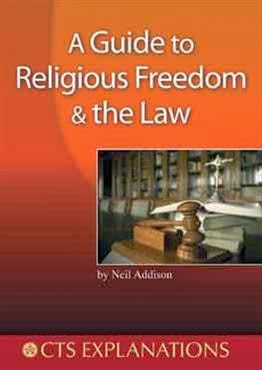The US Supreme Court in a close 5 - 4 judgement has decided that a "for-profit", ie commercial, business can still claim to religious protection for the beliefs of its, relatively small, group of owners.
Burwell, Secretary of Health and Human Services v. Hobby Lobby Stores INC 30 June 2014 USSC involved companies which were commercial but which nevertheless were run by a small number of individuals with specific religious beliefs which they attempted to put into practice in the running of their business. As the judgement explains
Hobby Lobby’s statement of purpose commits the Greens [ie the owners] to “[h]onoring the Lord in all [they] do by operating the company in a manner consistent with Biblical principles.” App. in No. 13–354, pp. 134–135 (complaint).Each family member has signed a pledge to run the businesses in accordance with the family’s religious beliefs and to use the family assets to support Christian ministries. 723 F. 3d, at 1122. In accordance with those commitments, Hobby Lobby and Mardel stores close on Sundays,even though the Greens calculate that they lose millions in sales annually by doing so. Id., at 1122; App. in No. 13– 354, at 136–137. The businesses refuse to engage in profitable transactions that facilitate or promote alcohol use;they contribute profits to Christian missionaries and ministries; and they buy hundreds of full-page newspaper ads inviting people to “know Jesus as Lord and Savior.”
As a business Hobby Lobby was required by the Patient Protection and Affordable Care Act to provide Health Insurance provisions for their employees which they did not object to indeed they had been providing Health Insurance even before it became compulsory. However the owners [the Green Family] did object to paying for 4 specific types of Contraceptives which, in effect acted as Abortifacients by preventing embryo implantation after fertilisation. The owners of the business objected to paying for this Abortion procedure which went against their religious beliefs.
The US Supreme Court is to be congratulated in that it properly understood and articulated the fundamental issue in the case namely, whether the law has the right to compel and individual to be moral complicit in an immoral act, which is a question issue that the British Courts have consistently failed to acknowledge let alone understand
"The belief of the Greens ..... implicates a difficult and important question of religion and moral philosophy, namely, the circumstances under which it is immoral for a person to perform an act that is innocent in itself but that has the effect of enabling or facilitating the commission of an immoral act by another."
The main argument in the case revolved around the Religious Freedom Restoration Act of 1993 rather than the 1st Amendment to the US Constitution. The Act states that
“Government shall not substantially burden a person’s exercise of religion even if the burden results from a rule of general applicability.”
The main argument of the Secretary of Health revolved around whether a "for profit" corporation could claim to be involved in the "exercise of religion". In the judgment of the US Supreme Court such a corporation was entitled to the protection of claiming to exercise religion depending on the facts ie it is very unlikely that most for-profit corporations could claim protection under the Act but in cases of "closely held" corporations such as Hobby Lobby then the 1993 Act did apply.
Though the case has been widely proclaimed in the US it is a very specific case on very specific, and unusual facts and a very specific Act of Congress rather than the US Constitution so it is possible that it will have limited influence on jurisprudence internationally. However as already said at least the US Supreme Court has addressed the issue of moral complicity up front so that might encourage UK courts to do the same.
The issue was addressed to some extent by the Inner House of the Court of Session in Doogan v NHS Greater Glasgow & Clyde Health Board [2013] ScotCS CSIH_36 where the Court quoted with approval a South African case Christian Education SA v Minister of Education (2001) 9 BHRC53 where the Constitutional Court of South Africa said
"believers cannot claim an automatic right to be exempted by their beliefs from the laws of the land. At the same time, the state should, wherever reasonably possible, seek to avoid putting believers to extremely painful and intensely burdensome choices of either being true to their faith or else respectful of the law. "
In this respect it is perhaps interesting that Lady Hale, Justice of the UK Supreme Court, emphasised the importance of issues of conscience in a speech on 13 June 2014 when she cast doubt on the validity of the Supreme Court decision Bull v Hall [2013] UKSC 73 which involved Christian B&B owners attempting to operate their B&B on Christian principles so perhaps the Hobby Lobby case will have some influence as a pointer that Courts should be reluctant to force anyone to act contrary to their conscience in business as well as elsewhere in life
Subscribe to:
Post Comments (Atom)



No comments:
Post a Comment